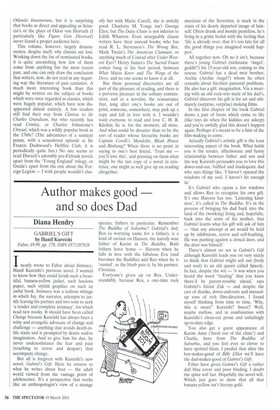Author makes good and so does Dad
Diana Hendry
GABRIEL'S GIFT by Hanif Kureishi Faber, £9.99, pp. 178, ISBN 0571207928
Inearly wrote to Faber about Intimacy, Hanif Kureishi's previous novel. I wanted to know how they could lavish such a beautiful, banana-yellow jacket, such luscious paper, such stylish graphics on such an awful book. Intimacy was a tedious whinge in which Jay, the narrator, attempts to justify leaving his partner and two sons to seek 'a tender and complete intimacy', for which read new nooky. It should have been called Change because Kureishi has always been a witty and evangelic advocate of change and challenge — anything that avoids death-inlife stasis and is prompted by desire and/or imagination. And to give him his due, he never underestimates the fear and pain (reaching to terror and despair) that accompany change.
But all is forgiven with Kureishi's new novel, Gabriel's Gift. Here he returns to what he writes about best — the adult world viewed from the vantage point of adolescence. It's a perspective that works like an anthropologist's view of a strange species, fathers in particular. Remember The Buddha of Suburbia? Gabriel's dad, Rex (a worrying name for a father), is a kind of variant on Haroon, the naively wise father of Karim in The Buddha. Both fathers leave home — Haroon when he falls in love with the fabulous Eva (and becomes the Buddha) and Rex when he is 'ousted', as the blurb puts it, by his partner, Christine.
Everyone's given •up on Rex. Understandably, because Rex, a one-time rock musician of the Seventies, is stuck in the stasis of his dearly departed image of himself. Often drunk and mostly penniless, he's living in a grimy bedsit with the feeling that 'life is already over, that it's too late for all the good things you imagined would happen'.
All together now. Oh no it isn't, because there's young Gabriel (nickname 'Angel', geddit?) his 15-year-old son, coming to the rescue. Gabriel has a dead twin brother, Archie (Archie Angel?) whom he often consults about his/their parental problems. He also has a gift: imagination. Via a meeting with an old rock-star mate of his dad's, Gabriel discovers his gift is for art and ultimately (surprise, surprise) making films.
In the first chapter of the book Gabriel draws a pair of boots which come to life (like toys do when the kiddies are asleep) and you're awfully glad this doesn't happen again. Perhaps it's meant to be a hint of the film-making to come.
Actually Gabriel's artistic gift is the least interesting aspect of the book. What holds you is the tender, affectionate and funny relationship between father and son and the way Kureishi persuades you to love this down-and-out, baffled and inadequate dad who says things like, 'I haven't opened the windows of my soul. I haven't let enough in.'
It's Gabriel who opens a few windows and allows Rex to recognise his own gift. It's one Haroon has too. 'Listening kindness', it's called in The Buddha. It's in the process of bringing his dad back into the land of the (working) living and, hopefully, back into the arms of his mother, that Gabriel learns what his gift will ask of him — 'that any attempt at art would be held up by inhibitions, terror and self-loathing. He was pushing against a closed door, and the door was himself.'
There's almost no sex in Gabriel's Gift although Kureishi leads you on very nicely to think that Gabriel might sell out (body and soul) to an old queen called Speedy. In fact, despite the wit — 'it was when you heard the word "healing" that you knew there'd be parent-trouble ahead,' says Gabriel's friend Zak — and despite the cast of drunks, down-and-outs and messedup sons of rich film-directors, I found myself thinking from time to time, 'Why, this is sweet!' Kureishi? Sweet? Well, maybe mellow, and in combination with Kureishi's clean-cut prose and unfailingly up-to-date edge.
You also get a guest appearance of Karim Amir (fresh out of the clinic') and Charlie, hero from The Buddha of Suburbia, and you feel ever so clever to have spotted them. I predict that after the boy-makes-good of Billy Elliot we'll have the dad-makes-good of Gabriel's Gift.
Faber have given Gabriel's Gift a rather dull blue cover and poor binding. I doubt the spine will last. Hopefully the novel will. Which just goes to show that all that banana yellow isn't literary gold.


































































 Previous page
Previous page